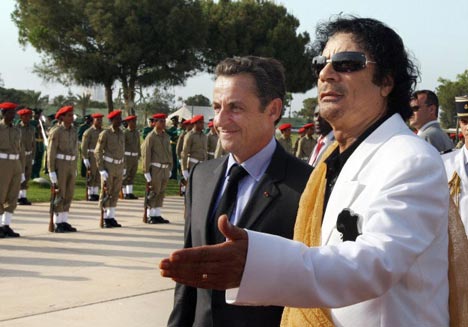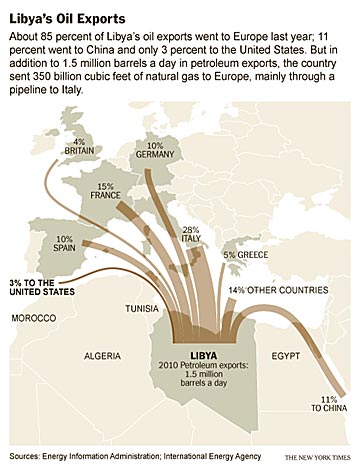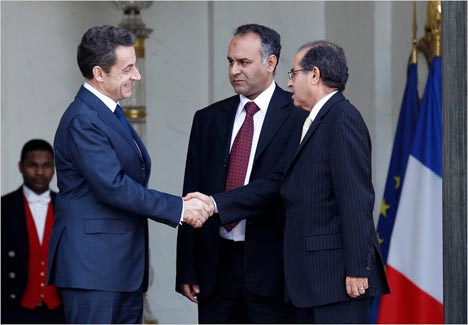
April 2011

That was then.
Libyan leader Muammar al-Qaddafi
(right) with French president Nicolas Sarkozy in July 2007. Qaddafi
helped
finance Sarkozy’s election campaign, now he wants his money back.
(Photo:
Patrick
Kovarik/AFP)
Back in the early 1970s, shortly after he took power, kicked the U.S. out of its gigantic air base and set up a National Oil Corporation, Muammar Qaddafi was hailed by much of the left as an “anti-imperialist.” Never mind that his “nationalization” of Libyan oil consisted mainly of production sharing agreements with the oil “multinationals” who agreed to give Libya a share of the profits. Never mind, also, that Colonel Qaddafi presented his “Green Book” as a “Third Universal Theory” counterposed to capitalism and “atheistic communism.” His Islamic version of “socialism” was based on a supposed “partnership” of workers and capital, in which trade unions will be replaced by “syndicates of engineers and technicians.” (This notion was borrowed directly from the ex-syndicalist Mussolini when as Il Duce [Leader] of fascist Italy he set up a corporatist capitalist state.) Never mind, once again, that under a 1973 law, Qaddafi specifically ordered that communists be repressed.
Despite his rhetoric, from the outset the Libyan leader was prepared to cut a deal with U.S. imperialism – and did, whenever it would let him. Patrick Seale and Maureen McConville in their book, The Hilton Assignment (1973), reported that the U.S. spy agencies early on sized up Qaddafi as a fanatical anti-communist. He aided Sudanese strongman Gaafar Nimeiry in 1971 in thwarting a coup by leftist officers and subsequently banning the Communist Party. The U.S. tipped off Qaddafi about a brewing coup plot in the Libyan military, while the British and Italian secret services squelched an attempt to free monarchist prisoners. In the late 1970s, a couple of supposedly former CIA agents, Edmund Wilson and Francis Terpil, “made a deal with Col. Muammar el Qaddafi to supply the Libyan strongman with explosives for huge sums of cash,” plus former Green Berets to set up a training school in terror tactics, according to investigative reporter Seymour Hersh (“The Qaddafi Connection,” New York Times Magazine, 9 and 16 August 1981). Hersh reported that several participants thought they were working on a CIA “op.” In 1980, Qaddafi hailed the CIA-sponsored mujahedin fighting the Soviet Army in Afghanistan.
Under the Reagan administration in Washington, with its close ties to the oil industry, things began to change. The U.S. began actively plotting to overthrow the Libyan leader. In June 1981, Reagan signed a secret intelligence “finding” directing the CIA to support anti-Qaddafi exiles. In October 1981, the National Front for the Salvation of Libya was set up. In May 1984 the NFSL sent a team of 15 gunmen to try to kill Qaddafi in his residence. Despite U.S. Executive Order 11905 (issued by President Gerald Ford in 1976) banning U.S. participation in political assassinations, the NFSL was financed by the CIA, and its agents trained the hit squad in Europe, Sudan and Morocco, Jack Anderson reported in the Washington Post (12 June 1985). When that assassination attempt failed and several of the plotters were executed, Washington turned to military provocation. Under the code name “Operation Prairie Fire,” it repeatedly sending an armada to invade waters claimed by Libya in the Gulf of Sidra in early 1986. When Qaddafi finally responded that March, U.S. jets bombed a Libyan patrol boat, killing 35 sailors.
Following the bombing of the La Belle discothèque in Berlin, Germany in which two U.S. soldiers were killed, Reagan launched massive air strikes against Libya in mid-April, supposedly in retaliation. The earlier deadly U.S. attack on Libyan patrol boats was passed over in silence by the imperialist media, and in fact, the April attack, “Operation El Dorado Canyon” had long been in the works.
From the early 1980s until the late ’90s, Qaddafi was repeatedly at odds with U.S. and French imperialism. He actively intervened in a civil war in Chad, Libya’s neighbor to the south, occupying the Tibesti desert region and backing Muslim FROLINAT insurgents. After Libyan tanks occupied the Chadian capital in December 1980, the U.S. Central Intelligence Agency along with French intelligence began funding the forces of ousted president Hissène Habré, as well as founding the NFSL and its exile army. The latter was described as “a bunch of Libyan contras,” referring to the Nicaraguan counterrevolutionary mercenary army bankrolled by Washington in the same period. Habré regained power in 1983, and after a series of skirmishes defeated the Libyans (who had lost their Chadian allies) in 1987. However, in 1990, Habré was ousted by Idriss Déby, backed by Qaddafi. The NFSL army was obliged to leave Chad, 350 of its soldiers settling in the U.S. where they continued to receive military training (Washington Post, 18 May 1991, cited in a December 1996 Congressional Research Service brief on Libya).
 However,
in
the
mid-1990s,
Islamist mujahedin (holy warriors)
who had been armed, trained and paid by
the U.S. to fight against
the Soviets in Afghanistan
began an insurgency in the Cyrenaica region of eastern Libya. Qaddafi
reacted strongly,
and was eventually able to suppress the insurgency. As the United
States was also increasingly at odds with
its former Islamic mercenaries, with Clinton
ordering the bombing of a plant in Khartoum in
response to 1998 embassy bombings in Kenya
and Tanzania,
the Libyan leader sought a rapprochement with the West. Particularly
after
George W. Bush invaded Iraq
in March 2003, Qaddafi intensified negotiations with Washington,
eventually turning over materials for a dubious nuclear weapons program
(most
of the crates from North Korea were unopened). Libya also agreed to
pay compensation for the victims of the 1986 La Belle disco, 1988 Pan
Am Flight
103 and 1989 UTA Flight 772 bombings, in exchange for removal of
economic sanctions
on Libya in 2008.[1]
Libyan
and U.S. agencies began
collaborating closely in fighting Al Qaeda in Africa.
However,
in
the
mid-1990s,
Islamist mujahedin (holy warriors)
who had been armed, trained and paid by
the U.S. to fight against
the Soviets in Afghanistan
began an insurgency in the Cyrenaica region of eastern Libya. Qaddafi
reacted strongly,
and was eventually able to suppress the insurgency. As the United
States was also increasingly at odds with
its former Islamic mercenaries, with Clinton
ordering the bombing of a plant in Khartoum in
response to 1998 embassy bombings in Kenya
and Tanzania,
the Libyan leader sought a rapprochement with the West. Particularly
after
George W. Bush invaded Iraq
in March 2003, Qaddafi intensified negotiations with Washington,
eventually turning over materials for a dubious nuclear weapons program
(most
of the crates from North Korea were unopened). Libya also agreed to
pay compensation for the victims of the 1986 La Belle disco, 1988 Pan
Am Flight
103 and 1989 UTA Flight 772 bombings, in exchange for removal of
economic sanctions
on Libya in 2008.[1]
Libyan
and U.S. agencies began
collaborating closely in fighting Al Qaeda in Africa.
At the same time, Libya increased its holdings in major European corporations. The Libyan Investment Authority, Libyan Central Bank and other government agencies own 2% of the Fiat auto company, 7.5% of UniCredit (Italy’s biggest bank), 2% of the Italian defense and aviation manufacturer Finmeccanica, 7.5% of the Juventus football club and more than 3% of Pearson PLC, the textbook publisher (which also owns the London-based Financial Times and Economist), as well as a stake in Swedish and Russian aluminum companies Kubal and Rusal. Qaddafi also supported European rulers politically. After France became the first country to recognize the rebels’ “transitional council” in Benghazi, Qaddafi’s son Saif al-Islam demanded that “Sarkozy must first give back the money he took from Libya to finance his electoral campaign” (Foreign Policy, 16 March). Inter-imperialist rivalries also come into play: the fact that Germany imports only 7.5 % of its oil from Libya helps explain its non-participation in the NATO assault. On the other hand, when Rome recognized the rebel council it was partly out of concern by Italy’s ENI that France’s Total was parlaying its support for the rebels into bigger oil concessions. Both will be in a quandry, however, if Qaddafi holds on in Tripoli and the oil-producing areas.
The Libyan leader also tried to gain favor with the imperialists by clamping down on African immigration to West Europe, cutting the number of immigrants trying to enter Italy from Libya by more than three-quarters. This should give pause to black radicals and nationalists who still see Qaddafi as a champion of black African interests (e.g., an article on the Black Agenda Report website [23 March], noting that the Arab League is “contemptuous of Black Africa and Qaddafi's attempts to bring about African-Arab unity”). Appealing for EU aid, last year Qaddafi remarked at a ceremony in Rome, standing next to Italian prime minister Silvio Berlusconi, “Tomorrow Europe might no longer be European, and even black, as there are millions who want to come in.” He added:
“We don't know what will happen, what will be the reaction of the white and Christian Europeans faced with this influx of starving and ignorant Africans…. We don't know if Europe will remain an advanced and united continent or if it will be destroyed, as happened with the barbarian invasions.”
–BBC, 31 August 2010
Qaddafi may have said what he expected racist European rulers wanted to hear. But it’s quite a statement from a leader who once praised blackness and championed a United States of Africa.
 This is now. Sarkozy
with Mahmoud Jibril, head of the Libyan rebels “crisis
committee” in March. (Photo:
AP)
This is now. Sarkozy
with Mahmoud Jibril, head of the Libyan rebels “crisis
committee” in March. (Photo:
AP)
But now the wheel has turned once more, and Yankee imperialism is again after Qaddafi’s scalp. The Libyan contras, held in reserve in the U.S. all these years, have suddenly turned up in the rebel capital of Benghazi. On March 25, the media reported that Khalifa Hifter had suddenly been named head of the rebel armed forces. He would replace Abdel Fatah Younes, who had been head of Qaddafi’s special forces and interior minister until he suddenly switched sides at the beginning of the revolt. Younes, who is from eastern Libya, would remain as chief of staff. A few days later, with a little digging, the McClatchy newspaper chain reported that Hifter, a former commander of Libyan forces in Chad until he was captured in 1987 and “turned” by the CIA, “spent the past two decades in suburban Virginia” where “he established a life but maintained ties to anti-Gadhafi groups.” Suburban Virginia? In other words, he was a CIA asset.
A little more digging turns up a May 2006 memo by the Immigration and Refugee Board of Canada which cites a chapter of the book Manipulations africaines, published in Le Monde Diplomatique (March 2001) saying that “ the Haftar force, created and financed by the CIA in Chad, vanished into thin air with the help of the CIA shortly after the Hissène Habré government was overthrown by Idriss Déby” in 1990. A Congressional Research Service Issues Brief (19 December 1996), posted on the web site of the Federation of American Scientists, reports that the NFSL as well as its military wing, headed by former Col. Khalifa Hiftar, is “in exile with many of its members in the United States” and that sources indicate that “the United States provides money and training for the NFSL.” Subsequently, both Younes and Hiftar are claiming to be the commander of the hapless rebel forces, separately (and infrequently) visiting the “front” with their respective security details.
But
Qaddafi is not reverting to his “anti-imperialist” posturing
of yesteryear. In a personal letter (6 April) to “Our dear son,
Excellency,
Baraka Hussein Abu Oumama,” the Libyan leader pleads with the U.S.
president to call off the
bombing so that they can make common cause against Al Qaeda. Thus both
the
Libyan regime in Tripoli and the opposition in Benghazi are seeking the
blessing of Washington. Revolutionary Marxists
(Trotskyists) oppose both politically while defending Libya and seeking
to defeat the imperialist
onslaught and the rebel forces led by pro-imperialist quislings[2]
masquerading as democrats. ■
[1] In all of these cases, the U.S. blamed Libya, although the evidence is contested at the very least. In the case of the Pan Am 703 bombing, the former Libyan intelligence officer Abdel Basset Ali al-Megrahi was clearly framed, as the farcical trial and evidence presented by left-wing investigative journalist Paul Foot demonstrated. In 2007, the Scottish Criminal Cases Review Commission submitted an 800-page report concluding that Megrahi’s conviction was likely a “miscarriage of justice” (New York Times, 29 June 2007).
[2] Vidkun Quisling was the fascist leader of the puppet government of Norway under the German occupation in World War II.
To contact the Internationalist Group and the League for the Fourth International, send e-mail to: internationalistgroup@msn.com